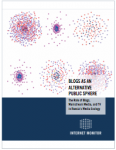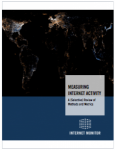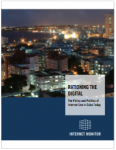The Internet Monitor special report series focuses on key events and new developments in Internet controls and online activity, incorporating technical, legal, social, and political analyses.

|
Blogs as an Alternative Public Sphere: The Role of Blogs, Mainstream Media, and TV in Russia’s Media Ecology Bruce Etling, Hal Roberts, Robert Faris | April 2014 Applying a combination of quantitative and qualitative methods, we investigate whether Russian blogs represent an alternative public sphere distinct from web-based Russian government information sources and the mainstream media. Based on data collected over a one-year period (December 2010 through December 2011) from thousands of Russian political blogs and other media sources, we compare the cosine similarity of the text from blogs, mainstream media, major TV channels, and official government websites. Download from SSRN |

|
Measuring Internet Activity Rob Faris, Rebekah Heacock | November 2013 This paper seeks to describe the conceptual and practical impediments to measuring and understanding digital activity and highlights a sample of the many efforts to fill the gap between our incomplete understanding of digital life and the formidable policy questions related to developing a vibrant and healthy Internet that serves the public interest and contributes to human wellbeing. Our primary focus is on efforts to measure Internet activity, as we believe obtaining robust, accurate data is a necessary and valuable first step that will lead us closer to answering the vitally important questions of the digital realm. |

|
Rationing the Digital: The Policy and Politics of Internet Use in Cuba Today Ellery Roberts Biddle | July 16, 2013 Cuba has one of the lowest Internet penetration rates in the Western hemisphere and is routinely ranked among countries with the highest restrictions on Internet use in the world. But within both categories, it is something of a rare bird. While the precise number of Internet users in the country is difficult to calculate, it is clear that a lack of infrastructure, combined with economic and political hurdles, has left access to the global Internet out of reach for most Cubans. But this may soon change. This spring, the country’s only telecommunications firm, the state-owned ETECSA, activated two undersea fiber optic cables that are set to drastically increase connection speeds in Cuba; the firm also opened over 100 cybercafes across the island. Officials have since made public promises to increase access and lower currently exorbitant fees for Internet use. This could fundamentally change the island’s information economy. |
